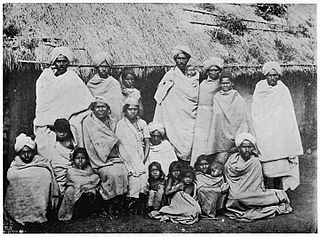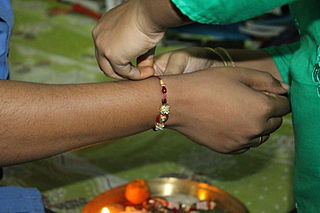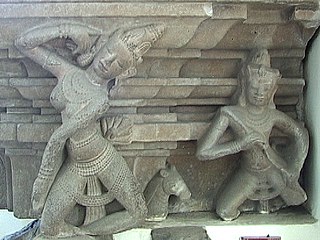
Divination is the attempt to gain insight into a question or situation by way of an occultic ritual or practice. Using various methods throughout history, diviners ascertain their interpretations of how a querent should proceed by reading signs, events, or omens, or through alleged contact or interaction with supernatural agencies such as spirits, gods, god-like-beings or the "will of the universe".

The Badagas are an ethno-linguistic community living in the Nilgiris district in Tamil Nadu, India. Throughout the district the Badugas live in nearly 400 villages, called Hattis. The Badagas speak a language called Badaga.

Puja is a worship ritual performed by Hindus to offer devotional homage and prayer to one or more deities, to host and honour a guest, or to spiritually celebrate an event. It may honour or celebrate the presence of special guests, or their memories after they die. The word puja is roughly translated into English as 'reverence, honour, homage, adoration, or worship'. Puja, the loving offering of light, flowers, and water or food to the divine, is the essential ritual of Hinduism. For the worshipper, the divine is visible in the image, and the divinity sees the worshipper. The interaction between human and deity, between human and guru, is called a Darshanam.

Yajna also known as Hawan in Hinduism refers to any ritual done in front of a sacred fire, often with mantras. Yajna has been a Vedic tradition, described in a layer of Vedic literature called Brahmanas, as well as Yajurveda. The tradition has evolved from offering oblations and libations into sacred fire to symbolic offerings in the presence of sacred fire (Agni).

Sindoor or sindura is a traditional vermilion red or orange-red cosmetic powder from the Indian subcontinent, usually worn by married women along the part of their hairline. In some North Indian Hindu communities, the sindoor is a visual marker of marital status of a woman and ceasing to wear it usually implies widowhood.

Raksha Bandhan is a popular and traditionally Hindu annual rite or ceremony that is central to a festival of the same name celebrated in South Asia. It is also celebrated in other parts of the world significantly influenced by Hindu culture. On this day, sisters of all ages tie a talisman or amulet called the rakhi around the wrists of their brothers. The sisters symbolically protect the brothers, receive a gift in return, and traditionally invest the brothers with a share of the responsibility of their potential care.
A Hindu wedding, also known as Vivaha, Marathi: Lagna (लग्न), Bhojpuri: Biyah (बियाह), Bengali: Bibaho (বিবাহ), Kalyanam, Kannada script: ಮದುವೆ (Maduve), Tamil: திருமணம் (Tirumanam), or Pelli, is the traditional wedding ceremony for Hindus. The wedding ceremonies are very colourful, and celebrations may extend for several days and usually a large number of people attend the wedding functions. The bride's and groom's home—entrance, doors, wall, floor, roof—are sometimes decorated with colors, flowers, and other decorations.

Antyesti, also known as Antima Samskara, Antya-kriya, Anvarohanyya, or as Vahni Samskara, literally means "last sacrifice" or "final auspicious ceremony", and refers to the funeral rites for the dead in Hinduism, which usually involves cremation of the body. This rite of passage is the last samskara in a series of traditional life cycle samskaras that start from conception in Hindu tradition.

The Hindu marriage is the most important of all the samskaras, the rites of passage described in the Dharmashastra texts.

Anand Karaj is the Sikh wedding ceremony, meaning "Act towards happiness" or "Act towards happy life", that was introduced by Guru Amar Das. The four laavaan were composed by his successor, Guru Ram Das. Although the recitation of Guru Amar Das' stanzas in Sikh ceremonies is a historical and enduring tradition, the practice of circumambulating around the Guru Granth Sahib to conduct a marriage ceremony is a relatively recent innovation that supplanted the tradition of circumambulating around the sacred fire (havan) in the early twentieth century. The Anand ceremony was originally legalised in India through the passage of the Anand Marriage Act of 1909, but is now governed by the Sikh Reht Maryada that was issued by the Shiromani Gurdwara Prabandhak Committee (SGPC).

Samskara are sacraments in Hinduism and other Indian religions, described in ancient Sanskrit texts, as well as a concept in the karma theory of Indian philosophies. The word literally means "putting together, making perfect, getting ready, to prepare", or "a sacred or sanctifying ceremony" in ancient Sanskrit and Pali texts of India.

Weddings in India are festive occasions and usually celebrated with extensive decorations, color, music, dance, outfits and rituals that depend on the community, region and religion of the bride and the groom, as well as their preferences. India celebrates about 10 million weddings per year, of which about 80% are Hindu weddings.

The Sri Sita Ramachandraswamy temple is a Hindu temple dedicated to Rama, a prominent avatar of the god Vishnu. It is located on the banks of the Godavari River in the town of Bhadrachalam in east Telangana, India. Often simply referred to as Bhadrachalam or Bhadragiri, Bhadradri, the temple is considered one of the Divya Kshetrams of Godavari and is also revered as Dakshina Ayodhya.
Bengali Hindu wedding refers to the traditional Bengali cultural wedding, usually with Hindu rites and rituals native to the Bengal region of Indian subcontinent which has been practiced through centuries.

Traditional marriage customs in the Philippines and Filipino wedding practices pertain to the characteristics of marriage and wedding traditions established and adhered by them Filipino men and women in the Philippines after a period of adoption courtship and engagement. These traditions extend to other countries around the world where Filipino communities exist. Kasalan is the Filipino word for "wedding", while its root word – kasal – means "marriage". The present-day character of marriages and weddings in the Philippines were primarily influenced by the permutation of Christian, both Catholic and Protestant, Hindu, Islam, Chinese, Spanish, and American models.
Pumsavana Simantonayana is a combined performance of the two Hindu rites of Pumsavana and Simantonnayana, practised during the contemporary period.

Ritu Kala Samskara, or Ritushuddhi, is a female coming-of-age ritual in South Indian Hindu traditions. The ritual is performed when a girl wears a langa voni for the first time.

A Gandharva marriage is one of the eight classical types of Hindu marriage. This ancient marriage tradition from the Indian subcontinent was based on consensual acceptance between two people, with no rituals, witnesses or family participation. The marriage of Dushyanta and Shakuntala was a historically celebrated example of this class of marriage.

Ihi, also spelled as Ehee, is a ceremony performed by the Newar people of Nepal in which pre-adolescent girls are ceremonially "married" to a bael fruit which is considered a symbol of either the Hindu deity Vishnu or the Buddha. It is believed that if the girl's husband dies later in her life, she is not considered a widow because she is married to Vishnu, and so already has a husband that is believed to be still alive. This was basically done to dodge the tradition of 'Sati Pratha', where after the husband dies, the widow sacrifices herself in the burning fire.
Bahaghara is a wedding ceremony performed by Odia Hindu people in the Indian state of Odisha. There are subtle differences in the rites observed by different castes. In Odia marriage rituals, the mother of the bridegroom does not take part in the ceremony. The Utkala Brahmins have their weddings only in the daytime, preferably at midday or in the morning, while the other caste weddings are done during the evening or night. There is the custom of sending betel nuts to family friends for inviting them to the marriage. The first invitation is sent to the family deity as a respect to the lord. Marriages in Odisha are mostly fixed and arranged by the parents. Marriages for serving or capturing is not common.















